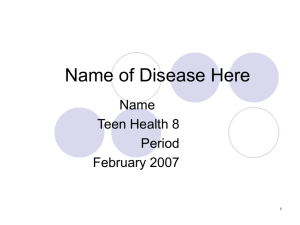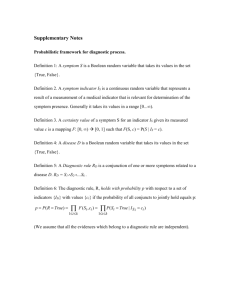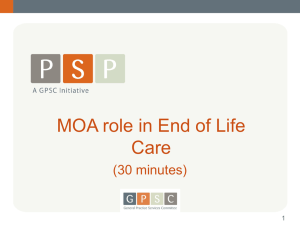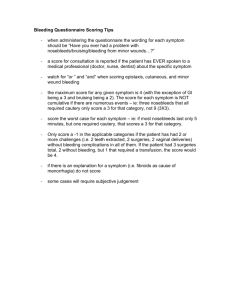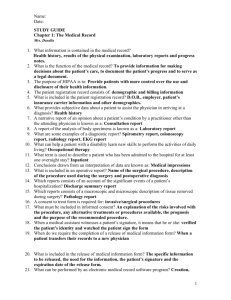EOL 302 - Skills for Care
advertisement
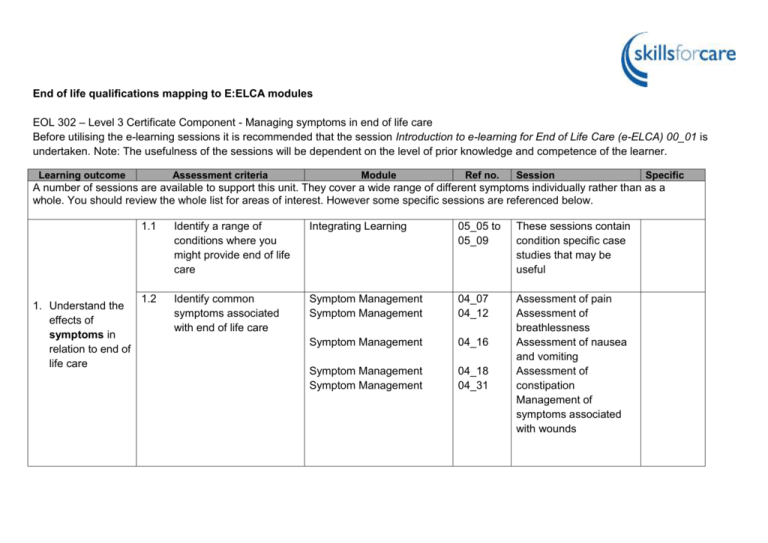
End of life qualifications mapping to E:ELCA modules EOL 302 – Level 3 Certificate Component - Managing symptoms in end of life care Before utilising the e-learning sessions it is recommended that the session Introduction to e-learning for End of Life Care (e-ELCA) 00_01 is undertaken. Note: The usefulness of the sessions will be dependent on the level of prior knowledge and competence of the learner. Learning outcome Assessment criteria Module Ref no. Session Specific A number of sessions are available to support this unit. They cover a wide range of different symptoms individually rather than as a whole. You should review the whole list for areas of interest. However some specific sessions are referenced below. 1. Understand the effects of symptoms in relation to end of life care 1.1 Identify a range of conditions where you might provide end of life care Integrating Learning 05_05 to 05_09 These sessions contain condition specific case studies that may be useful 1.2 Identify common symptoms associated with end of life care Symptom Management Symptom Management 04_07 04_12 Symptom Management 04_16 Symptom Management Symptom Management 04_18 04_31 Assessment of pain Assessment of breathlessness Assessment of nausea and vomiting Assessment of constipation Management of symptoms associated with wounds 1.3 1.4 2. Be able to manage symptoms of end of life care 2.1 Explain how symptoms can cause an individual distress and discomfort Evaluate the significance of the individual’s own perception of their symptoms Demonstrate a range of techniques to provide symptom relief Symptom Management 04_01 Symptom Management 04_24 to 04_26 Symptom Management 04_30 Symptom Management 04_36 to 04_41 Assessment 02_03 Assessment 02_08 Symptom Management 04_04 Symptom Management 04_08 Symptom Management 04_13 General approach to assessment of symptoms These sessions cover symptom management in the last days of life that may be useful Symptom management complicated by coexisting conditions These sessions cover symptom management in the advanced illness that may be useful Assessment of physical symptoms Context of assessment: cultural and language issues Individual preferences and cultural influences on symptom management Principles of pain management Drug management of breathlessness 2.2 2.3 Describe own role in supporting therapeutic options used in symptom relief Respond to an individual’s culture and beliefs in managing their symptoms Symptom Management 04_14 Symptom Management 04_17 Symptom Management Symptom Management 04_19 04_31 Symptom Management 04_06 Symptom Management 04_08 Symptom Management 04_14 Symptom Management 04_28 Advance Care Planning 01_02 Symptom Management 04_04 Non-drug management of breathlessness Management of nausea and vomiting Management of constipation Management of symptoms associated with wounds Recognising your own limitations in symptom management Principles of pain management Non-drug management of breathlessness Non-drug interventions in symptom management Cultural and spiritual considerations in ACP Individual preferences and cultural influences on symptom management 2.4 2.5 Actively support the comfort and wellbeing in end of life care Recognise symptoms that identify the last few days of life may be approaching Assessment 02_08 Communication 03_08 Communication Symptom Management 03_14 04_06 Symptom Management 04_26 Symptom Management 04_32 to 04_41 Spirituality 08_03 Assessment 02_14 Symptom Management 04_23 Context of assessment: cultural and language issues Understanding and using empathy Information giving Recognising your own limitations in symptom management Managing distress during the dying phase These sessions cover the assessment and management of mood and advanced illness symptoms that may be useful Spiritual care and the models of spiritual intervention Assessment of dying phase and after-death Recognising the dying phase, last days of life and verifying death 3. Understand how to manage symptoms of pain 3.1 Identify signs that may indicate that an individual is experiencing pain Symptom Management Symptom Management 04_07 04_08 Assessment of pain Principles of pain management 3.2 Describe factors that can influence an individual’s perception of pain Assessment 02_08 Symptom Management 04_04 Context of assessment: cultural and language issues Individual preferences and cultural influences on symptom management Describe a range of assessment tools for monitoring pain in individuals , including those with cognitive impairment Symptom Management Symptom Management 04_07 04_08 Symptom Management 04_11 Symptom Management 04_29 Integrating Learning 05_09 Symptom Management 04_08 Symptom Management 04_27 3.3 3.4 Assessment of pain Principles of pain management Managing different types of pain Symptom management in people with learning disabilities or mental health problems Case study: dementia Explain how to maintain regular pain relief Principles of pain management Use of syringe drivers 4.1 4. Be able to integrate symptom management in the care management process Explain how symptom management is an important part of the care planning process Symptom Management 04_01 Symptom Management 04_02 Symptom Management 04_03 General approach to assessment of symptoms Agreeing a plan of management and care Communicating the plan of management and care 4.2 Regularly monitor symptoms associated with end of life care Symptom Management 04_05 Influence of transition points and crises on decision-making 4.3 Report changes in symptoms according to policies and procedures in own work setting Symptom Management 04_03 Symptom Management 04_05 Communicating the plan of management and care Influence of transition points and crises on decision-making 4.4 Support the implementation of changes in the care plan Symptom Management 04_05 Influence of transition points and crises on decision-making
